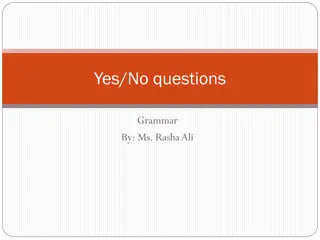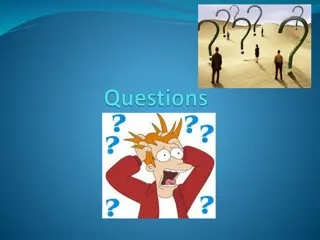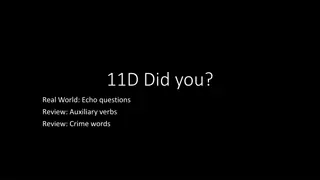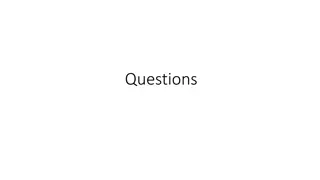Mastering Tag Questions in English Grammar
Explore the intricacies of framing tag questions in English grammar through various examples and guidelines. Understand the structure of tag questions based on the statement being positive or negative, with different scenarios explained in a detailed manner. Enhance your knowledge on tag questions and improve your English language skills with this comprehensive overview.
Download Presentation

Please find below an Image/Link to download the presentation.
The content on the website is provided AS IS for your information and personal use only. It may not be sold, licensed, or shared on other websites without obtaining consent from the author.If you encounter any issues during the download, it is possible that the publisher has removed the file from their server.
You are allowed to download the files provided on this website for personal or commercial use, subject to the condition that they are used lawfully. All files are the property of their respective owners.
The content on the website is provided AS IS for your information and personal use only. It may not be sold, licensed, or shared on other websites without obtaining consent from the author.
E N D
Presentation Transcript
Content Prepared by Ms. C. SASIKALA Assistant Professor, Department of English, Jamal Mohamed College, Trichy 620 020.
QUESTION QUESTION TAG TAG
Definition end of a statement in order to draw attention to it or give it an added force. Methods of framing tag questions 1. If the statement is positive, the tag is negative. auxiliary verb + n t + pronoun. Eg: He is retired, Isn t he? This book is very costly, isn t it? I am kind, aren t I ? (am + not = aren t I) Tag questions are questions attached to the
2. If the statement is negative, the tag is positive. auxiliary verb + pronoun Eg : Prema has no children, Has she? she did not attend your marriage, did she? 3. Without auxiliary we should use main verb. Eg: They read a book. main verb = read (simple present tense) I, we, you , they = do He , she, it = does the sentence is positive, so the tag must be negative. So the question tag for the sentence is, They read a book, don t they?
They wrote a letter Here, wrote is a past tense , I, we , you, they , he , she, it = did now, the tag is , They wrote a letter = didn t they? 4. If words like none/ no-one / nobody /nothing / nowhere, etc., occur in a sentence, it is taken to be a negative statement, and the tag is positive. Eg: none have come, have they? We saw no-one in the hall, did we? I keep nothing to myself, do I?
5. If a sentence has a semi-negative, the sentence is treated as negative, and therefore the tag is positive. Eg: My father seldom goes out, does he? Preetha rarely pets her children, does she? 6. The suggestion beginning with the word Let s shall we? Eg: Let s go for a walk, shall we ? Let s donate blood, shall we?
7. Imperative sentences, whether positive or negative, have the tag Will you? . If the imperative sentence has a touch of urgency, it has the negative tag, Won t you? Eg: Give food to the beggar, will you? Wear a tie, will you? Listen to me, wont you? (urgency) 8. Though everybody, everyone, no one, nobody, someone, somebody, are singular, for the purpose of framing the tag, we use they. Eg: No one will accept it, will they? Everyone came yesterday, didn t they?
But , every boy, every girl takes a singular tag. Eg: Every boy gave me a present, didn t he? Every girl wrote the test, didn t she? 9. If necessary, the verb in the positive statement is spilit. Eg: My brothers have had their breakfast, haven t they?
EXERCISES 1. You have written the letter. 2. You returned the book 3. Suja will be there. 4. Her father is busy. 5. I am always with you. 6. Let s watch TV 7. Close the door 8. Nobody likes him 9. I drew a line 10.There were only a few guests.























